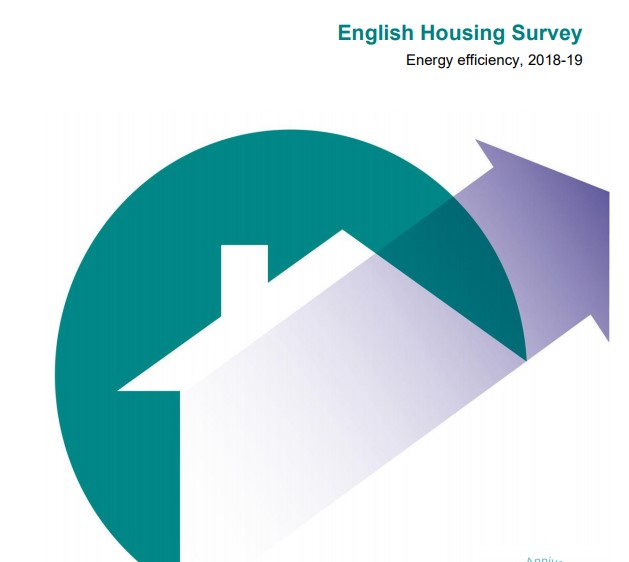English Housing Survey 2018-19
Contents |
[edit] Introduction
BRE is proud to have played a major role in the development of the new English Housing Survey 2018-2019 reports. The English Housing Survey is a continuous national survey commissioned by the Ministry of Housing, Communities and Local Government (MHCLG). It collects information about people’s housing circumstances and the condition and energy efficiency of housing in England. It is one of the longest standing government surveys and was first run in 1967.
[edit] BRE collaboration
The annual publications are the culmination of the work BRE does each year in collaboration with its partners NatCen Social Research and CADS Housing Surveys to collect, model and report on the data.
In 2020, BRE was the the lead author on the ‘Energy efficiency, 2018-19’ and ‘Profile and condition of the English housing stock, 2018-19’ reports, as well as leading on the production of the ‘Accessibility of English homes’ and ‘Size of English homes’ factsheets.
[edit] Highlights
The energy efficiency report produced a number of interesting findings, including the fact that the energy efficiency of the English housing stock has increased over the last decade. A third of dwellings are now in the highest bands (A to C) (up from 9% in 2008), while the proportion of dwellings in the lowest energy efficiency bands F or G has decreased over the same period.
The report also shows where improvement in the stock is possible. For example, just over a quarter of private rented dwellings have less than 100mm of loft insulation, and rented homes in general are more likely to experience condensation, damp or mould problems than owner-occupied homes.
Each year initial results are published in a headline report at the beginning of the year. This is followed by a series of more detailed reports released in the summer.
Find out more at: https://www.gov.uk/government/collections/english-housing-survey#2018-to-2019
This article originally appeared on the BRE website under the headline, 'BRE proud to have played major role in new English Housing Survey 2018-19 reports'. It was published in August 2020.
[edit] Related articles on Designing Buildings Wiki
- Accessibility in the built environment.
- BRE articles on Designing Buildings Wiki.
- Domestic building.
- Energy targets for buildings.
- English housing stock age.
- Ministry of Housing, Communities and Local Government (MHCLG).
- People with disabilities.
- The Housing Stock of The United Kingdom.
[edit] External resources
- CADS Design Services, English Housing Surveys.
- Gov.uk, English Housing Survey 2018-19: Accessibility of English homes.
- Gov.uk, English Housing Survey 2018: Energy report.
- Gov.uk, English Housing Survey 2018-19: Profile and condition of the English housing stock.
- Gov.UK, English Housing Survey 2018-19: Size of English homes.
- NatCen Social Research.
Featured articles and news
The need for a National construction careers campaign
Highlighted by CIOB to cut unemployment, reduce skills gap and deliver on housing and infrastructure ambitions.
AI-Driven automation; reducing time, enhancing compliance
Sustainability; not just compliance but rethinking design, material selection, and the supply chains to support them.
Climate Resilience and Adaptation In the Built Environment
New CIOB Technical Information Sheet by Colin Booth, Professor of Smart and Sustainable Infrastructure.
Turning Enquiries into Profitable Construction Projects
Founder of Develop Coaching and author of Building Your Future; Greg Wilkes shares his insights.
IHBC Signpost: Poetry from concrete
Scotland’s fascinating historic concrete and brutalist architecture with the Engine Shed.
Demonstrating that apprenticeships work for business, people and Scotland’s economy.
Scottish parents prioritise construction and apprenticeships
CIOB data released for Scottish Apprenticeship Week shows construction as top potential career path.
From a Green to a White Paper and the proposal of a General Safety Requirement for construction products.
Creativity, conservation and craft at Barley Studio. Book review.
The challenge as PFI agreements come to an end
How construction deals with inherited assets built under long-term contracts.
Skills plan for engineering and building services
Comprehensive industry report highlights persistent skills challenges across the sector.
Choosing the right design team for a D&B Contract
An architect explains the nature and needs of working within this common procurement route.
Statement from the Interim Chief Construction Advisor
Thouria Istephan; Architect and inquiry panel member outlines ongoing work, priorities and next steps.
The 2025 draft NPPF in brief with indicative responses
Local verses National and suitable verses sustainable: Consultation open for just over one week.
Increased vigilance on VAT Domestic Reverse Charge
HMRC bearing down with increasing force on construction consultant says.
Call for greater recognition of professional standards
Chartered bodies representing more than 1.5 million individuals have written to the UK Government.























